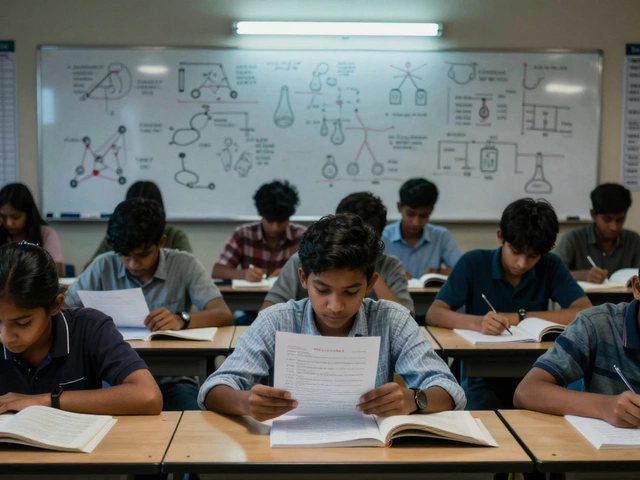Studying abroad can be the adventure of a lifetime, but choosing the right destination also comes with its set of hurdles. Some countries are known for their rigorous academic programs that challenge even the brightest students, while others test your mettle with entirely different languages and cultural landscapes.
But why would one country be harder to study in than another? Is it the intensity of the coursework, the complexity of the language, or perhaps the nuances of the local culture that heighten the challenge? In this exploration, we'll delve into these questions, shedding light on the countries considered the hardest to study in.
Unearthing these insights will provide you with a fuller understanding of the demands and rewards of studying abroad in a challenging country, guiding you in making an informed decision for your educational journey.
- Understanding Academic Rigor Across Nations
- Navigating Language Barriers and Communication
- Cultural Adjustments and Social Challenges
- Financial and Logistical Obstacles
- Tips for Thriving in Challenging Study Environments
Understanding Academic Rigor Across Nations
When it comes to studying abroad, the level of academic rigor can vary dramatically from one country to another. For international students, this can mean the difference between a fulfilling academic journey and a stressful challenge. The term 'academic rigor' encompasses a wide range of elements such as the intensity of study programs, expectations placed on students, and the kind of educational culture that is prevalent across different nations. In countries like Germany and South Korea, academic rigor is seen as a cornerstone of their educational systems, renowned for structuring classes and curricula that demand a high level of commitment and critical thinking from students.
The academic structure in Germany, for example, is highly focused on independent learning. Students are often expected to proactively engage with materials, contributing to class discussions and working through complex problems on their own. It's not unusual for students to spend long hours in libraries, preparing for exams that are known for their challenging nature. In fact, students in these countries often remark on the necessity of rigorous time management skills as a pivotal factor in their success. Education here is not merely about grades, but about developing a deep, analytical understanding of the subject matter.
South Korea's educational system, on the other hand, is characterized by its high-pressure environment and strong emphasis on examinations. Students face dense schedules, where early morning and late-night study sessions are the norm. According to a survey by the International Institute for Educational Planning, South Korean students engage in study activities for over 10 hours a day, which is among the highest in the world. The focus is heavily on achieving top results in assessments that often determine future academic and professional prospects. This rigorous approach extends not just to university education but is deeply embedded in high school systems, paving the way for students to adapt to university life which continues this high paced educational rhythm.
Sir Ken Robinson once noted, "The fact is that given the challenges we face, education doesn't need to be reformed – it needs to be transformed." This transformation varies from place to place, highlighting cultural values that shape an individual's educational experience.
It's important to remember that while some thrive in environments with strong academic demands, others may struggle. The culture of education prevalent in Japan is distinct with its collective learning methods, where group activities and peer interactions are key aspects of the curriculum. Japanese universities, for example, have been recognized for fostering a sense of camaraderie among students rather than encouraging competition, leading to a unique blend of academic pursuit and social integration. This camaraderie becomes a support system that eases the challenging coursework.
There are several factors to consider when evaluating academic rigor globally. Discussions often revolve around curriculum depth, the balance of theoretical versus practical learning, and the amount of student assessment. Understanding how these elements play out in different study abroad destinations can help students find a match that aligns with their personal and academic goals. Whether you're drawn to the detail-oriented lecture halls of French universities or the tech-savvy classrooms of Finnish institutions, recognizing the unique traits of each country's academic rigor will pave the way for a successful international educational journey.
Navigating Language Barriers and Communication
When venturing into a foreign land for education, linguistic challenges often headline the list of obstacles that international students encounter. Embracing the language of a new country is not just about deciphering textbooks or acing language exams; it is a deep dive into the realm of everyday conversations and cultural nuances. For students in study abroad programs, language serves as the bridge and sometimes the hurdle to truly understanding and integrating into the local society. In countries such as Japan and China, known for their hard-to-master languages with complex characters and tonal variations, students may find the initial months daunting.
The significance of language proficiency extends beyond academics. It's the key to forming friendships, accessing local support systems, and fully immersing oneself into the cultural tapestry of the host nation. For students studying in European countries like Germany or France, where English is less commonly used outside the classroom, mastering the native tongue often becomes imperative for daily interactions. In these contexts, complete cultural immersion often leads to improved language skills, thus opening doors to deeper social connections.
Renowned journalist Fareed Zakaria once said, "One of the best ways to see a country is through the language."
"Learning this will allow you to penetrate the culture that much more."Preserving this openness not only aids in overcoming linguistic barriers but also enriches the personal growth of students, turning what might seem like a formidable challenge into an enriching journey.
For those excited yet apprehensive about their own potential language struggles during their international tenure, strategies can ease the transition. Enrolling in language courses tailored to international students, engaging with native speakers through language exchange programs, and embracing local media content like films, music, and literature are all means of accelerating language acquisition. Moreover, leveraging technology for language learning, via mobile apps and online platforms, can complement traditional learning methods, providing an interactive edge to the process.
Take heart; there's accommodating flexibility in academic institutions abroad. Many universities offer support services specifically geared towards international students, including language centers and tutors, ensuring that language proficiency is bolstered alongside academic progression. Embracing these resources will fortify one's confidence across both personal and professional spheres, allowing students to thrive rather than just survive in a hardest country to study setting.
The journey to mastering a new language and navigating communication barriers is fraught with challenges but equally filled with valuable lessons. The keys to these new doors become the treasures of one's educational odyssey, making the effort to overcome this particular hurdle more than worthwhile in the grand scheme of studying abroad.

Cultural Adjustments and Social Challenges
Studying abroad is not merely about books and exams; it's a deep dive into a completely different world that extends beyond the four walls of a campus. Students frequently encounter significant cultural adjustments and social challenges that are both awe-inspiring and overwhelming. Picture yourself stepping into a bustling street filled with unfamiliar scents, buzzing dialects, and cultural norms that clash starkly with your own. For many international students, this is the reality when they choose to study in a foreign land. Understanding local customs and integrating into an educational system that might prioritize aspects of learning unfamiliar to you can be daunting.
Take Japan, for instance, a country renowned for its impeccable discipline and harmony. Students moving to Japan often speak of the 'senpai-kohai' system, a mentoring relationship that fosters a strong sense of hierarchy and respect. This system can feel alien to students from more egalitarian cultures where informal interactions with faculty are the norm. In contrast, breaking the ice socially in Japan may need more than just language proficiency; it requires a deep understanding of their cultural metaphors and nuances.
Language is perhaps the most immediate cultural barrier to cross. Even in countries with a high level of English proficiency, local dialects can mystify. Students in Thailand, for instance, often have trouble adapting due to the tonal nature of the Thai language. Language is the portal to understanding culture, and for those unwilling or unable to adapt linguistically, the experience might be isolating. Moreover, this can affect everyday tasks like ordering food or asking for directions, leaving students feeling disconnected from the society around them.
"Once one understands the significance of language as the core of culture," says famed linguist Deborah Tannen, "it becomes clear how essential it is to the social fabric of life in a foreign land."
Then there are social norms. In regions like the Middle East, social customs can surprise Western students. Something as mundane as a greeting can become intricate, with specific traditions around handshakes and personal space. Adapting to such social etiquettes requires resilience and patience. Social integration can often take precedence over academic performance, emphasizing the crucial role of local friendships and networks in leading not just to emotional well-being, but also academic success.
Let's not overlook food culture. A substantial part of cultural adjustment involves embracing regional cuisines. While it can be an exciting venture into diverse palates, for others, it might spell dietary adjustments or even restrictions. For instance, students heading to India will encounter a rich spice palette that is integral to local foods. This may necessitate a significant culinary adaptation, presenting yet another challenge side by side with the academic pursuit.
But how do students navigate these cultural and social challenges effectively? Here are some actionable strategies:
- Embrace an Open Mind: Approach every new experience with curiosity and openness. Being willing to learn and adapt is critical.
- Learn Basic Language Skills: Even a simple hello or thank you in the native language can foster goodwill and demonstrate respect.
- Immerse in Local Activities: Join clubs or activities that connect with the local culture; this eases integration and combats feelings of isolation.
- Seek Guidance: Don't hesitate to reach out to mentors or local friends who can offer insights into navigating cultural intricacies.
- Emphasize Self-Care: Cultural shock is real, and it’s important to take care of your mental health during such transitions.
Being in a new environment with distinct cultural dynamics emphasizes personal growth amid academic pursuit. The challenge is in building a balanced life, making these distant lands not just a place for educational success, but a true second home.
Financial and Logistical Obstacles
When choosing to study abroad, financial and logistical considerations often loom large over the decision-making process. The cost of education can vary widely depending on the country, and certain countries known for their prestigious educational institutions also come with hefty price tags. For instance, tuition fees in the United States often exceed $30,000 annually for international students, not accounting for books, supplies, and additional academic resources that can further push costs higher.
Then there's the cost of living, which can drastically shift based on location. Consider studying in cities like London or Tokyo; accommodation, transportation, and basic necessities can be unexpectedly expensive. A meal out and a regular public transport pass can eat away at a student's budget rather quickly. Students often find themselves in a constant juggle between budget constraints and the necessities of a decent living standard.
But the financial hurdles do not end there. There exists the obstacle of currency exchange rates, which can fluctuate unpredictably, posing additional financial uncertainty. This ebb and flow can mean you or your sponsors need to prepare for changes in expenses that might not have been initially anticipated. The logistical element of adjusting to these financial demands requires international students to plan meticulously, often relying on detailed budgeting, and in some cases, taking part-time jobs within legal limitations to make ends meet.
Scholarships and financial aid can offer relief, but they are typically competitive and often provided with stiff requirements. It’s worth noting how the criteria for international students can be quite different and set fees are not inclusive of hidden expenses like visa fees, insurance, and taxes. Consider these items carefully when calculating the total costs of studying abroad. According to a recent study from the Institute of International Education, only about 25% of international students receive some form of financial assistance from their host universities, highlighting the importance for students to seek aid from diversified sources.
Logistics can also involve understanding and navigating the often complex visa processes. Different countries require different documentation, fees, and background checks, which can take months to prepare and process. Missing out even a single document can mean significant delays or even a denial of entry, impacting your educational trajectory. Considerations for travel insurance and health insurance should also be carefully examined—many countries mandate health insurance for international students, which adds another layer of financial burden. As such, expert opinion like that from Professor Jane Campbell, a well-regarded figure in international education, declares,
Finding your way through financial aid and logistical arrangements is not only a part of the learning experience but can itself be transformative, equipping students with vital life skills.
The entire journey of navigating these financial and logistical hurdles is essentially about being proactive. Creating a comprehensive checklist that includes financial planning, reviewing potential living expenses, visa requirements, insurance plans, and understanding currency fluctuations can make a tremendous difference. It's wise to communicate with existing or previous international students to gather tips and real-life insights on money management within specific locales. By doing so, prospective international students can brave the financial labyrinth and transform challenges into lifelong learning experiences.

Tips for Thriving in Challenging Study Environments
Tackling the complexities of studying in a challenging foreign country is no small feat, but with the right mindset and preparation, it can turn into an enriching experience. One of the primary aspects of succeeding in such environments is to maintain an adaptive attitude. The ability to adjust quickly to changes and embrace new learning methods can make the transition smoother. Students might find themselves grappling with unique cultural norms and expectations, ranging from academic standards to social etiquettes. Immersing yourself in the local culture and actively participating in community events can ease this adjustment phase.
Language is often the most immediate challenge; hence, it’s crucial to place emphasis on being proactive in language learning. This might mean enrolling in supplementary language courses or engaging in conversation with native speakers. In many countries considered difficult to study, universities offer language labs or tandem programs where international students can practice their skills in a supportive environment.
Financial planning plays a critical role and having a realistic budget tailored to the cost-of-living in your host country is paramount. Consider the fluctuations in your spending habits as you adapt to new lifestyles — dining out, transportation, and academic materials can differ greatly from your home country. Utilizing student discounts and seeking part-time work opportunities, if permissible, can help manage finances efficiently. According to a study by the Institute of International Education, students who prepared adequately financially had a 25% higher satisfaction rate with their study abroad experience.
Academic resilience is another vital component. Courses may be more extensive and require different approaches. Leverage study groups, connect with peers, and don't shy away from seeking help from professors. Many institutions offer academic support services tailored for international students to help bridge the educational gaps. As Einstein wisely put it,
"Education is not the learning of facts, but the training of the mind to think."This mindset can significantly boost your ability to handle challenging academic environments.
An often-overlooked aspect is building a support network which includes both local and international friends. Engaging with student organizations or online communities helps mitigate feelings of homesickness and loneliness, providing a sense of belonging. A University of Manchester survey found that students with robust support systems reported a 30% reduction in stress levels. So, don't hesitate to reach out; the connections you forge can be lasting friendships or even academic collaborations.

